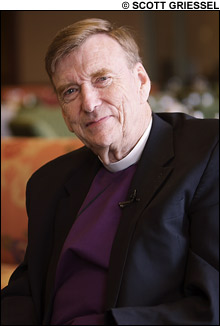
IN HER CORNER: Retired bishop of Newark John Shelby Spong says of Ragsdale, “I think she’ll be a spectacular dean.” |
Pushing ahead
There is, in Ragsdale's own telling, something highly improbable about the path that brought her to where she is today: leader of a major Episcopal institution, walking embodiment of contemporary Episcopalian liberalism, right-wing bête noire. She got involved in progressive politics almost by accident, for example, landing an office-manager job at Common Cause Virginia after graduating from William & Mary University in Williamsburg, Virginia, and before heading to Virginia Theological Seminary (VTS) in Alexandria. Three days later, the executive director quit, and Ragsdale found herself lobbying the legislature in the state where she was born and raised.In 1985, one year into her studies at VTS, the bishop she had thought would ordain her died — and his replacement subsequently told Ragsdale that he didn't ordain lesbians. (At the time, Ragsdale says, she didn't even know that she was a lesbian.) So she eventually found someone who did — John Shelby Spong, then the Episcopal bishop of Newark, New Jersey, an iconic figure to aggressively liberal Christians of all stripes and a vocal champion of gay rights in the Episcopal Church.
Ragsdale's involvement with the abortion issue, too, seems almost accidental. Also in 1985, she began representing the Episcopal Women's Caucus on the board of the Religious Coalition for Abortion Rights (since re-named the Religious Coalition for Reproductive Choice). But at the outset, Ragsdale says, "I wasn't even particularly pro-choice. . . . I hadn't given it a lot of thought. Being a lesbian, it wasn't a big issue for me, personally."
Clearly, things have changed. And now, a quarter-century later, Ragsdale finds herself in a position somewhat reminiscent of that held by Gene Robinson back in 2003. To wit: depending on your point of view, the fact that Ragsdale is about to run an institution charged with shaping the minds of the Episcopal clergy is proof either of how far the Episcopal Church has come or how far it's fallen.
The Reverend Peter Frank — a spokesperson for the Pittsburgh-based Anglican Communion Network, which is attempting to create a parallel, conservative network of formerly Episcopal churches here in the US — is inclined to the latter view. "That a seminary of the Episcopal Church will be led by a priest who believes that abortion is a blessing and that Jesus was primarily a first-century progressive political activist is, sadly, not a surprise," Frank tells the Phoenix via e-mail. "The Rev. Katherine Ragsdale may be more vocal than most, but her opinions are not uncommon among Episcopal Church leaders."
Spong, who retired as bishop of Newark in 2000, has a radically different take. "When Katherine came into our diocese," he recalls, "she was just a vital human being — very popular with other clergy, active in the political maneuvering of [the annual Episcopalian General Convention], frequently on her feet on the floor talking. She had enormous intellectual capacity. I think she'll be a spectacular dean."
What's more, Spong contends, Ragsdale's appointment at EDS demonstrates that the issue of gay rights is essentially settled, once and for all, in the Episcopal Church. "In my opinion," he says, "the battle over gay equality has been over a long time. It's just that religious and political forces keep it alive, for various reasons. But that battle's over."